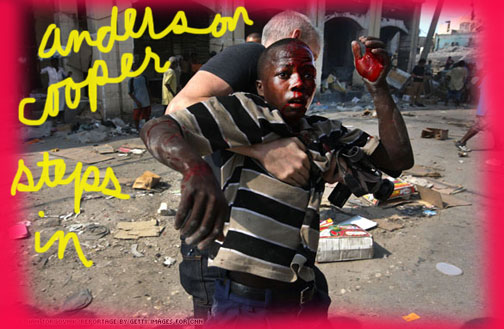
In the cauldron of suffering and chaos that has been Haiti since the earthquake, some reporters have found themselves stepping out of the role of observers into the role of participants.
This makes all the sense in the world. If a child is in danger do you help or do you stand by and do nothing in the name of “objectivity” and so-called media ethics?
As a mother and, well, a human being I find this question to be a no-brainer. But some of those who have stepped outside their journalistic roles to help some of those in terrible need have been huffily criticized by their media peers—notably CNN’s Dr. Sanjay Gupta, who actually had the gall to, for a brief time this past week, put his ethics as a physician and a surgeon first.
AOL news has the story about various reporters who in the past week have stepped outside the traditional boundary of neutral witness.
By the way, this is a discussion I frequently have with students, editors and with other journalists every time I’m in the position of being interviewed about my profession.
To my way of thinking, the principle that is the highest value in the pantheon of journalistic ethics is transparency: never lie to your reader (or viewer or listener). (That also means lying by omission.) As a journalist, you make a contract with the reader to be as truthful as is possible. It is a contract you break at your own and everyone else’s peril.
Journalists in one way or another affect every story they cover, simply by their presence. All journalists also have biases that they need to guard against and, when necessary, disclose. In other words, pure objectivity does not exist. Real ethics, however, do exist. In this era of changing journalistic rules, we would be best of differentiating which ethics are real, and which are false.
UPDATE: NPR’s All Things Considered has a multi-layered take on this issue that is also interesting. Here’s a clip:
“What disturbs me about the media doctors is that they are basically pulling telegenic people out of the queue and giving them exceptional resources,” says Dr. Steven Miles, a medical professor and bioethicist at the University of Minnesota.
Miles served as the medical director of the American Refugee Committee for 25 years, and he has overseen relief efforts in places such as Cambodia, Laos and Banda Aceh, Indonesia. He says doctors who largely have experience working in highly advanced civil societies, including the U.S., may not understand the extreme choices facing those addressing catastrophes such as the one in Haiti.
Opinions?
Photo by Jonathan Torgovnik Reportage for Getty Images for CNN

Transparency does strike me as a pretty big deal. Which is why I was annoyed at Josh Marshall and TPM during the 2008 election. They’ve made a name by doing quality advocacy journalism online – everybody knows their biases and motivations but because they work hard to get their facts right, they can break stories and make a little noise in a way few other blogs can. But then we have Hilary v. Obama and suddenly the transparency ethic is gone. I think they decided that transparency can be bad for business. You don’t want to alienate the Hilary fans or piss off the Obama supporters. So time to shut up and keep quiet.
Anyway, my sense is that, ethics aside, transparency can build a closer relationship between journalist and reader. It can also alienate readers who use the journalist’s biases as a hook for their discontent w/ the reporting (ex: they’re all liberal over at the NY Times so it’s all garbage). As news grows more niche, that tradeoff between more passionately committed readers and a larger base of viewers tilts in favor of the smaller, passionate group. In other words, we’re entering an age where business pushes journalists toward transparency.
2i2esG jsqfefswqodl, [url=http://ndivxsnzlues.com/]ndivxsnzlues[/url], [link=http://izqihwuzgree.com/]izqihwuzgree[/link], http://tkakzxqjxfsy.com/
buy tadalafil online or amoxicillin side effects or order viagra or vicodin facts or buy vicodin online
propecia in uk or quick forum readtopic propecia none content or subaction showcomments propecia smile posted or buy propecia online or cheaper way to buy propecia
xanax suicide or quick forum readtopic viagra signature content or ultram withdrawal or buy ativan online or is paxil an maoi
generic wellbutrin xl side effects or online drug stores with alprazolam or where to buy acai berries or hydrocodone medicine for sale or authentic phentermine without prescription
achat viagra cialis or prise de clomid or clomid steroid or cialis switzerland or achat de viagra
allegra versace wikipedia or cialis launch or paxil 12.5 or ibuprofen and codeine or allegra d 24
News. Today
News. Today
News. Today